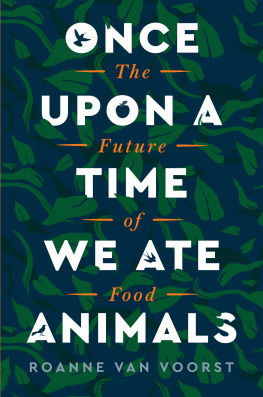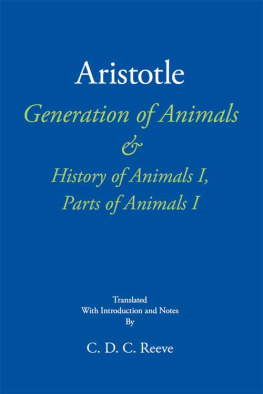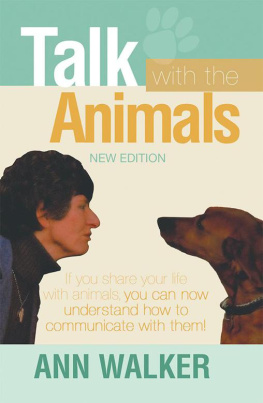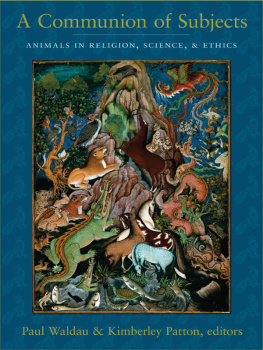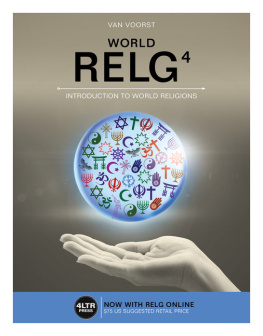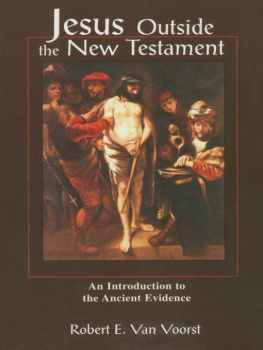Contents
Title Page
Dedication
Epigraph
1. How Farmers Can Change the World
2. Why Good People Believe in Bad Stories
Intermezzo: We Didnt Know
3. From Pasty and Peeved to Sexy as Fuck
4. Giraffes for the Rich, Vegetables for the Poor, and Milk for All
5. Wanted: Man (2040), Sporty, Sexy, Vegan
6. Plant Overdose
Intermezzo: A School Trip to the Slaughterhouse
7. Its the Law, Stupid!
8. Melting Ice, Bursting Levees
Epilogue: The Beginning of the End
Acknowledgments
Want to Know More?
Bibliography
Notes
About the Author
Copyright
About the Publisher
Three centuries ago, the Enlightenment took place and burning people as witches or condemning them for their beliefs became illegal. Over 150 years ago (around eight generations, by my reckoning), slavery was abolished all over the world, and it became illegal to brand other human beings, hold them against their will, misuse, or mistreat them in any other way. Around 100 years ago (five generations), women in the Western democracies were given the right to vote and formally became equal to men. You and I live in similarly turbulent, important, and exciting times.
Our age will go down in history for the immense social, economic, and cultural changes that are unfolding right now, at the very moment that you are reading this book. It is a transformation that is taking place all over the world in all kinds of places, and it wont be long before it suddenly strikes you. You will see it in the things you buy, the work you do, the way you raise your childreneven in the way you think and feel. And when it gets to that stage, it will almost be as if things were never any different.
You and I are part of the generation that will see unnecessary animal suffering become a thing of the past in large areas of the world. This means that while the consumption and use of meat or other animal products may still go on in the near future, it will become more difficult and much more expensive. It will be a choice that differs from the norm; a choice rejected by most people. Whether you support this huge change or are against it, it is already happening; you cannot halt it, for we are in the midst of it.
Try to imagine yourself standing on a green hilltop and trying to move an enormous, heavy boulder. You push against the boulder with both hands, dig your heels into the grass, tense your core and your legs... It doesnt work, the boulder stays where it is, and you, you swear, you puff, you groan, you think it might be impossible to budge itand then suddenly it starts to roll. Youve managed to find the boulders tipping point. It rolls slowly at first, then faster and faster until the boulder rolls so fast that you know it will be impossible to stop even if someone tried. We have now reached the same sort of tipping point. We are all on the edge of this shift from a slow-paced to a fast-paced movement, a movement that can no longer be stopped.
Were on a Roll
Veganism is one of the fastest-growing movements in the world. More and more scientists and futurists predict that eating meat and dairy will become much less common and may even become a social taboo in the near future. A growing number of people are saying that veganism is one of the last remaining options we have to combat climate change, and their message is being heard. In the 1990s, there were about a million people worldwide who ate no meat or dairy or did not use any animal productsoften because they were saddened by the plight of animals, sometimes because they believed it was bad for the environment or their body. By 2015, this number had grown at least a hundredfoldaccording to some, even up to around 750 million.
In 2008, the city of Ghent in Belgium was the first city in Europe to promote a weekly meat-free day in schools and other public institutions. This idea had already gained some traction in the US; the next city to implement this was in the UK, and by 2019, forty cities worldwide were taking part in the practice, and this number continues to grow.
In 2018, Australiathe country that at the start of the twenty-first century consumed the most meat in the worldhad one of the fastest-growing vegan markets on the planet. More and more Aussies are choosing soy over steak. The country came in third, behind the United Arab Emirates and China, in the number of people who are choosing to eat vegan.
In the United States, not only have sales of meat alternatives (such as soy burgers and plant-based meat pieces that have the taste and texture reminiscent of chicken breast) increased enormously in recent years, but sales of dairy alternatives such as coconut yogurt and almond milk have also risen. By 2021, these alternatives will make up 40 percent of all milk-style drinks, compared to 25 percent in 2016. Sales of cows milk meanwhile dropped. Dairy Farmers of America, the largest milk cooperative in the United States and the supplier of 30 percent of the countrys milk, made a billion dollars less in 2018 than the year before. This trend isnt solely limited to the US but has also been noted in the Netherlands, the UK, Germany, Australia, Italy, and Canada. In January 2019, the Canadian Food Inspection Agency published new national health guidelines that recommend to go light on animal proteins. What do they recommend instead for a balanced diet? Plant-based, protein-rich foods.
The global egg industry is also beginning to notice the sudden sharp drop in demand for animal products: Cal-Maine Foods, a huge American egg producer, recently reported its first annual loss in more than ten years. Shares plummeted; the company CEO said that the losses were due to the increasing popularity of egg alternatives.
In light of this, smart businesspeople would do better by investing in the vegan food industryfor example, in products such as nut cheese. By 2024, its estimated global market value will be close to $4 billion, with annual growth of about 8 percent. Or they should invest in milk-like alternatives made from oats, soy, rice, or almonds. After ninety-two years, Elmhurst, one of the oldest dairy producers in the eastern United States, recently made the decision to switch to producing only plant-based milk alternatives; the companys CEO says this is the best way to prevent future losses.
Plant-based alternatives to meat are also doing well: so well, in fact, that traditional meat producers have decided to invest en masse, often buying out vegan companies. For example, Tyson Foods, the biggest meat producer in the US, has already invested in the most popular meat alternative in the American market: Beyond Meat. Canadas largest meat distributor, Maple Leaf Foods, bought the popular plant-based brands Field Roast and Lightlife Foods. Nestl, the biggest food and beverage company in the world, took over Sweet Earth Foods, a company that makes exclusively plant-based products (and was set up by a former CEO of Burger King). Danone took over plant-based pioneer WhiteWave, while Unilever bought the Vegetarian Butcher.
The Dutch newspaper De Volkskrant considered this million-dollar sale as symbolic of the rise of meat substitutes and noted that multinationals and even meat producers are currently starting to get in on the vegetarian market. International business magazine


